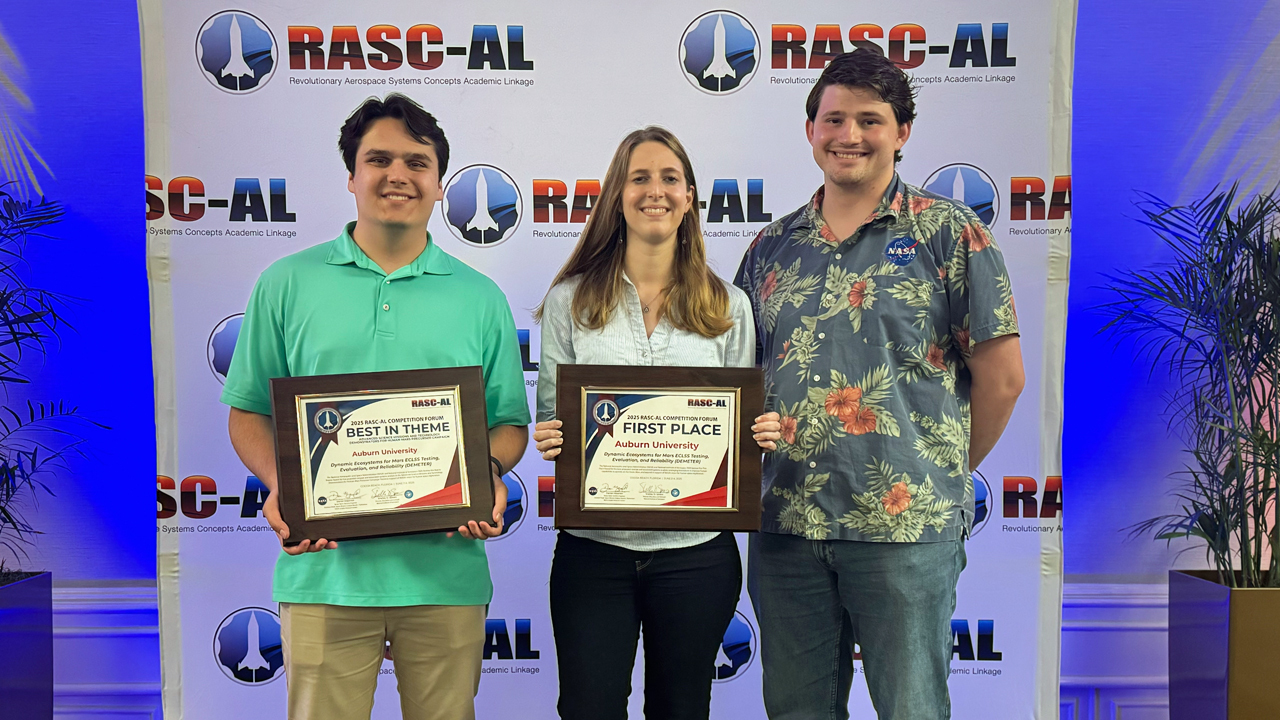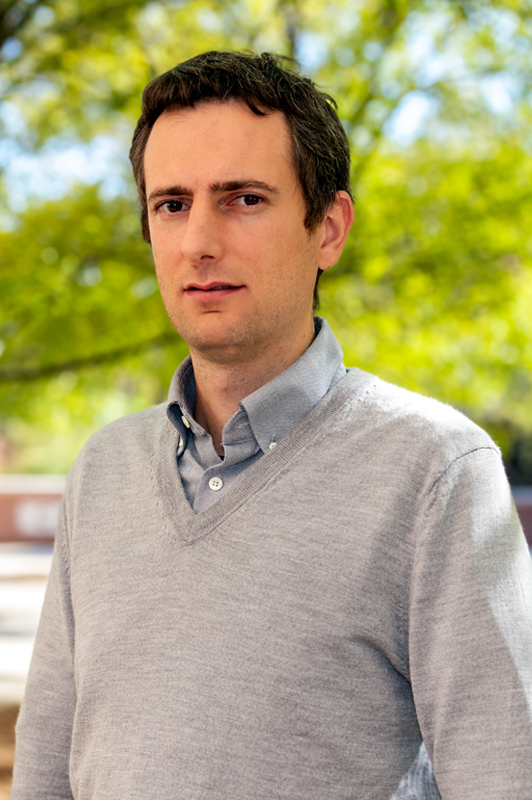Auburn Engineering team wins NASA's RASC-AL Competition
Published: Jun 18, 2025 8:00 AM
By Dustin Duncan
A team of aerospace engineering graduates took top honors in NASA’s 2025 Revolutionary Aerospace Systems – Academic Linkage (RASC-AL) Competition Forum, where undergraduate and graduate teams competed to develop new concepts for operating on the Moon, Mars and beyond.
Katherine Clemmons, Chris Raj and Ayden Kemp — each of whom graduated this past May with a bachelor’s degree in aerospace engineering—presented their project, “Dynamic Ecosystems for Mars Environmental Control and Life Support Systems (ECLSS) Testing, Evaluation, and Reliability (DEMETER),” taking home the top prize out of 14 finalist teams from academic institutions across the nation.
Raj said the competition was an incredible opportunity to connect with people from across the country and industry, as well as to see what other schools envision as the future of aerospace engineering.
“We believe that DEMETER is a revolutionary concept that could have profound effects on long-duration space exploration, and we cannot wait to see how this area develops,” he said. “We were all incredibly happy to win this —for both the team and for Auburn Engineering. It's a testament to all the hard work we’ve put in and to those who have helped us along the way.”
The Auburn team was advised by Davide Guzzetti, associate professor in aerospace engineering.
Clemmons explained that the two-year proposed mission would demonstrate the transfer of plants to Mars. It would also showcase the propagation of plants in an enclosed capsule on the Martian surface, the assimilation of Martian carbon dioxide into edible biomass while producing oxygen, and the phytoremediation of wastewater — critical steps in preparing for a biological life support system (BLSS) on future crewed missions to Mars.
The students proposed that duckweed could remove more than 90% of contaminants from wastewater, recover nearly all oxygen from carbon dioxide and recycle nutrients like carbon and nitrogen—elements typically lost in current environmental control and life support systems that produce food.
Guzzetti said he often incorporates RASC-AL themes into the Space Mission Design track of the senior capstone courses.
“The student team continued working on the project after their graduation and through the month of May to prepare for the competition,” Guzzetti said. “I’m glad their perseverance and commitment led to this achievement. I hope the results of DEMETER inspire more students to explore space mission design and investigate innovative new concepts for space exploration that push the boundaries of what's possible."
Brian Thurow, chair of aerospace engineering, shared his excitement and pride in the team and their advisor.
“From the moment a student steps foot on campus, we stress the importance of being involved in student projects and other extracurricular activities. These are essential components of a premier engineering education,” Thurow said. “The success of DEMETER highlights the dedication and work ethic of this outstanding group of students, who are truly deserving of this recognition.”
The Auburn team will present their work at the 2025 AIAA Accelerating Space Commerce, Exploration, and New Discovery (ASCEND) Conference in Las Vegas, Nevada, in July. The second-place team — Virginia Polytechnic Institute and State University — will also present at the conference.
The RASC-AL Competition, held June 2–4 in Cocoa Beach, Florida, is designed to bridge the gap between academia and the aerospace industry. It empowers undergraduate and graduate students to apply their classroom knowledge to real-world challenges in space exploration.
This year’s themes included “Sustained Lunar Evolution – An Inspirational Moment,” “Advanced Science Missions and Technology Demonstrators for Human-Mars Precursor Campaign” and “Small Lunar Servicing and Maintenance Robot.”
RASC-AL is open to undergraduate and graduate students studying disciplines related to human exploration, including aerospace, biomedical, electrical and mechanical engineering. The program allows students to incorporate their coursework into space exploration objectives in a collaborative environment, while helping to bridge strategic knowledge gaps aligned with NASA’s vision. Students have the opportunity to interact with NASA officials and industry experts, often forming relationships that may lead to further participation in NASA’s student research initiatives.
RASC-AL is sponsored by the Strategies and Architectures Office within the Exploration Systems Development Mission Directorate at NASA Headquarters, and by the Space Mission Analysis Branch within the Systems Analysis and Concepts Directorate at NASA Langley. It is administered by the National Institute of Aerospace.
Media Contact: , dzd0065@auburn.edu, 334-844-2326
From left, Chris Raj, Katherine Clemmons and Ayden Kemp presented their project, “Dynamic Ecosystems for Mars Environmental Control and Life Support Systems (ECLSS) Testing, Evaluation, and Reliability (DEMETER),” taking home the top prize out of 14 finalist teams from academic institutions across the nation.



